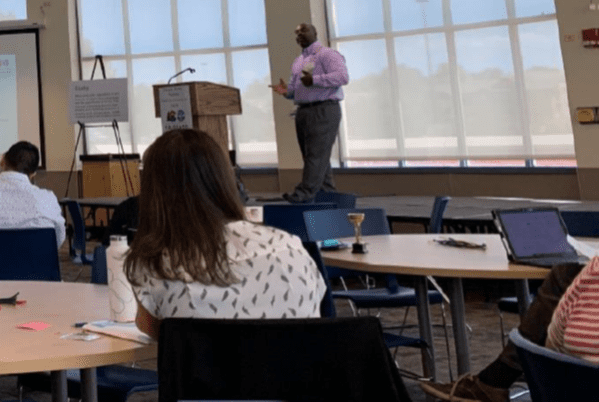Colorado health advocates presented to the Joint Budget Committee on glitch-plagued Public Health Emergency Unwind.
Recent articles
2024 Legislative session: addressing economic challenges at the individual and state level
Addressing economic challenges at the individual and state level after the 2024 Colorado legislative session.
CCLP’s 2024 legislative wrap-up, part 2
CCLP's 2024 legislative wrap-up focused on expanding access to justice, removing administrative burden, supporting progressive tax and wage policies, preserving affordable communities, and reducing health care costs. Part 2/2.
CCLP’s 2024 legislative wrap-up, part 1
CCLP's 2024 legislative wrap-up focused on expanding access to justice, removing administrative burden, supporting progressive tax and wage policies, preserving affordable communities, and reducing health care costs.
Thoughts from the “People, Power, Purpose: Charting a Course for Equity Conference”

Champions for racial equity convened at Front Range Community College on July 19 to learn how to challenge institutionalized oppression, foster new cross-sector partnerships and provide people with the proper tools to do the work. Titled “People, Power Purpose: Charting a Course for Equity,” the conference was hosted by the Office of Health Equity of the Colorado Department of Public Health and Environment (CDPHE). Attendees included people from a variety of backgrounds, such as government agencies, school districts, advocacy organizations, direct service nonprofits, think tanks and philanthropy groups.
The event opened with remarks from Sarah Hernandez from the Office of Health Equity. She described the six bases of social power: legitimate, expert, referent, reward, coercive and informational power, and how they related to racial equity. She also described the difference between transactional power, a short-term gain that leaves a system’s structure in place, and transformational power, a long-term shift in values and political will. A unique component of the conference was the musical performance, performed by 2MX2 and Kid Astronaut. 2MX2 is a Latinx musical group that writes empowering music about problems that affect marginalized communities. Following the musical act, Kim Desmond, the keynote, spoke about the track to equity emphasizing the importance of restoration, revolution and rejuvenation.
Each participant was asked to attend two breakout sessions of their choosing. In the first round of sessions, one titled, “Planning Policies and Actions to Advance Equity,” presented by Susan Wood, Kimberly Ford, and Adam Perkins spoke about a Planning for Equity Policy Guide. The guide is on the American Planning Association’s website.
The presentation was followed by a robust conversation around the role of the community within urban planning. Audience members suggested that input from community members, specifically of people of color, should be introduced during each step of the planning process. This includes before any type of exchange occurs, during the planning, and during the implementation. The conversation also revolved around how organizations set priorities. One audience member stated that unless an organization supports the efforts around racial equity with policy and funding, then the organization does not truly prioritize racial equity. Furthermore, the session reiterated the gap between decision makers and communities, a problem that advocacy groups often face.
Another breakout session titled, “Sharing Power Through Authentic Community Engagement,” detailed a community engagement model utilized by Larimer County. Mandated by the 2008 Public Health Act, each public health agency must create a Community Health Improvement Plan (CHIP). Larimer County’s strategy to advance health equity — based on the Center for Disease Control’s framework — includes identifying social conditions of health inequities, assessing community readiness, sharing power with the community, analyzing relevant data, and reviewing how the changes affect the community. Larimer County created a decision-making body comprised of community members called The Healthy Larimer Committee, in which shares lived experience inform strategies for the Health Department and serves as the governing body that implements Larimer’s CHIP implementation. The members were selected by the Health Department through an application and an interview process. The Department focused on recruiting members of diverse backgrounds who live in Larimer County and are likely to be affected by decisions made by the department. The monthly convenings include childcare, food and the members are provided with a stipend and professional development opportunities. As CCLP dives deeper into community engagement, studying other models that have been successful, even if tailored toward local governments, this approach can help inform the strategy and promote success.
Overall, the conference directly aligned with CCLP’s focus on racial equity. As the organization moves forward through the racial equity journey, spending time in spaces with other champions is paramount to the work. The Office of Health Equity provided a glossary of terms to establish common language around equity.
Although the action steps provided by the Office are specifically targeted for community organizers and government organizations, they have significant relevance to advocacy organizations like CCLP in building a more equitable Colorado.
– By Christina Yebuah

